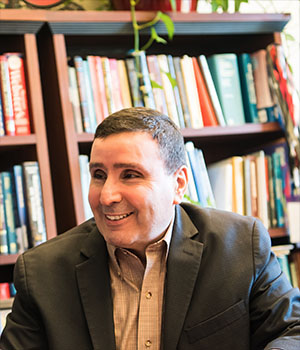
Kamal Youcef-Toumi
(he/him)
Mechanical Engineering
Building an empathetic community
Developing an “open and respectful bond” with each member of his lab is paramount to Youcef-Toumi. In a nomination letter, one lab member writes that “he genuinely cares and he knows that his time and patience listening to his students is what drives them to perform better.”
Professor Youcef-Toumi joined the MIT Mechanical Engineering Department faculty in 1985. He is the Director of the Mechatronics Research Laboratory and the Ibn Khaldun Fellowship, which is awarded to Saudi Arabian women, as well as Co-Director of the Center for Complex Engineering Systems. Youcef-Toumi’s research has focused primarily on design, control theory, and their applications to dynamic systems. He explores controller design for systems with unknown dynamics and, in particular, the development of control techniques with fast adaptation, modeling, and simulation of dynamic systems. Applications have included manufacturing, robotics, automation, metrology, and nano-scale video imaging. Professor Youcef-Toumi has authored over 300 publications, holds over 30 registered or pending patents, and has given over 200 invited seminars globally.
Compassionate Guidance
Students and colleagues consistently describe Youcef-Toumi as deeply empathetic and kind. He always asks after students’ wellbeing and is encouraging about triumphs, as well as ready to lend support with “words of wisdom born of experience… [and] genuine, thoughtful concern” amid struggle.
These qualities derive primarily from two sources: his faith and his personal experience of loss. Frequently, Youcef-Toumi turns to stories from the Quran to explain the sources of his values and thoughtful intentions. Youcef-Toumi lost both his parents and his son early in life. As he writes, based on these painful losses, “I am reminded that life happens outside of MIT.”
Graduate school is often a trying experience. “The struggles and stresses come in many forms such as lack of sleep, isolation, emotional ups and downs, intrapersonal and interpersonal conflicts, uncertainty in funding, time management, and much more, writes Youcef-Toumi. This intentional empathy with students’ experiences and perspectives is a Mentoring Guidepost identified by the Committed to Caring (C2C) program.
Humility matters to Youcef-Toumi. He is a lifelong student, eager to learn from all around him. In his words, “We seek knowledge from the cradle to the grave and remain receptive to learning from all interactions and experiences.”
Fostering Caring
Youcef-Toumi seeks to cultivate supportive relationships between all members of his laboratory, not only in his direct mentoring relationships. He often sets up teams of students in the lab, so they can extend the pattern of caring. Reminding students that “reaching out for assistance is not frowned upon but encouraged,” Youcef-Toumi as well as students and staff members in his laboratory proactively welcome new students with advice and recommendations of amenities in the area; introduce them to available resources; and generally cultivate a warm environment.
Indeed, Youcef-Toumi describes the lab as a “network of support through the rough times and an atmosphere where accomplishments are recognized and appreciated.”
Many of his students are from countries outside the United States. Youcef-Toumi is adept at making students feel welcome. One of his nominators fondly recalls Youcef-Toumi greeting them on their first day, writing that Youcef-Toumi’s “caring, help, and support made the transition to MIT and blending with the new environment very smooth.”
Keen to amplify student strengths and cognizant of the stakes for many of his students, Youcef-Toumi writes, “The students come with values of honesty and integrity. We strengthen those values. In the end, they can proudly represent their families, their countries of origin, and MIT.”
Emphasizing communication and team-building skills alongside the technical, Youcef-Toumi is generous with his time helping students practice these concepts. One student recalls an outpouring of support upon asking for help refining their writing: Youcef-Toumi “sat down with me for two hours every day, 11 days in a row, going through my thesis line by line.”
Truly, as one nominator noted, “Kamal is a gift to MIT, the students, and the general world at large.”
